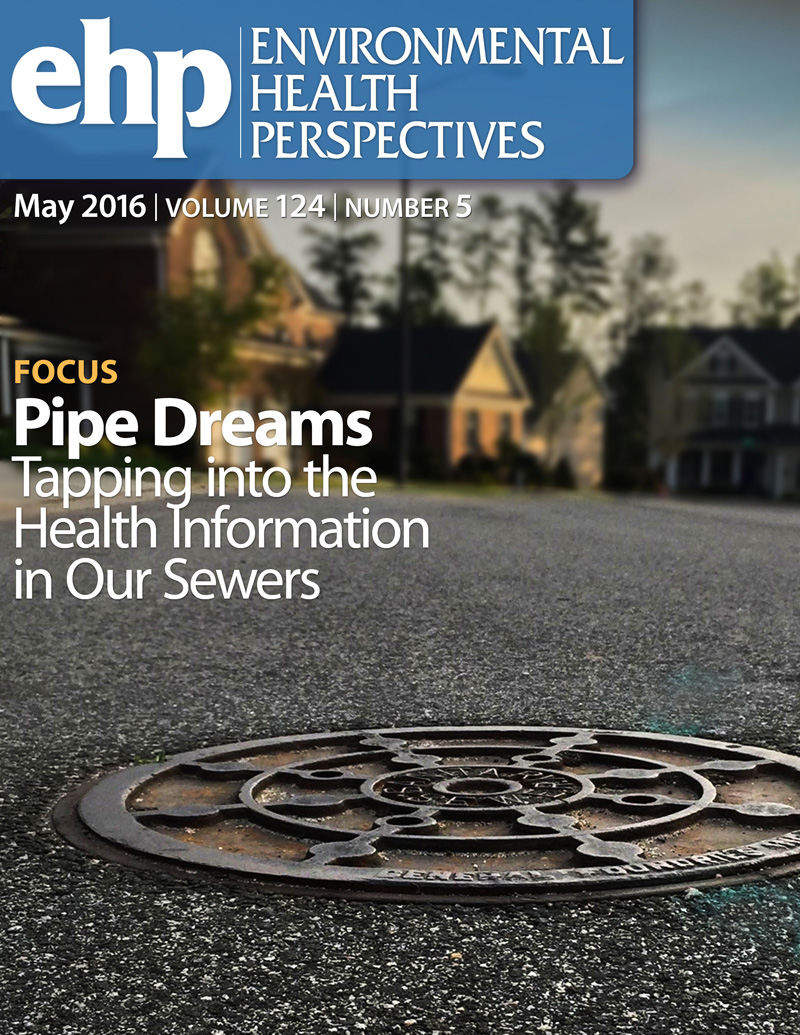中国育龄妇女甲状腺激素与多类农药环境暴露的横断面研究
IF 10.1
1区 环境科学与生态学
Q1 ENVIRONMENTAL SCIENCES
引用次数: 0
摘要
背景已经证明,一些杀虫剂会通过改变甲状腺激素(TH)水平来干扰甲状腺功能。然而,很少有人类研究探讨了甲状腺激素水平与环境暴露于目前使用的农药(包括新烟碱类、苯并吡唑、苯氧基酸和唑类)之间的关系。此外,此类研究通常测量尿液或血液中暴露的生物标志物,因此只能揭示近期的暴露情况。与此相反,头发已被证明是评估长期暴露于持久性和非持久性有机污染物的合适基质。目的 我们研究了与四碘甲状腺原氨酸(T4)、3,3',5-三碘甲状腺原氨酸(T3)、3,3',5'-三碘甲状腺原氨酸(rT3)和 3,3'- 二碘甲状腺原氨酸(T2)有关的 54 种污染物暴露生物标志物。方法 在一项针对 196 名健康中国育龄女性(25-45 岁)的横断面研究中,分析了 2016 年采集的头发基质前 12 厘米(从头皮开始)中污染物和 THs 的浓度。使用稳定性增强的最小绝对缩减和选择算子(lasso),通过将所有暴露与每个相关结果进行回归,并根据年龄、体重指数和城市进行调整,探讨了污染物与 TH 水平之间的关联。我们发现,β-HCH、五氯苯酚、DMP、DETP、3Me4NP、呋喃丹、ClCF3CA、吡虫啉、2,4-D、甲草胺、苯醚甲环唑和戊唑醇与 THs 相关。例如,在调整后的未校正回归模型中,毛发 DMP 浓度对数 10 转换后每增加 2 个标准差 (SD) 就会导致毛发 T4 浓度降低 [-15.0% (95% CI: -26.1, -2.21%)],毛发 T3 浓度升高 [8.16% (95% CI: 1.73, 15.0%)]。我们还发现了一些农药与 T3/T4、rT3/T4 和 rT3/T3 摩尔比的关系,包括五氯苯酚、DMP、2,4-D、甲草胺、苯醚甲环唑和戊唑醇。还需要进一步的研究来证实我们的结果,并评估这些微妙干扰的长期后果。https://doi.org/10.1289/EHP14378。本文章由计算机程序翻译,如有差异,请以英文原文为准。
Cross-Sectional Examination of Thyroid Hormones and Environmental Exposure to Multiclass Pesticides in Women of Reproductive Age in China.
BACKGROUND
Some pesticides have been shown to interfere with thyroid functions through changes in thyroid hormone (TH) levels. However, few human studies have explored associations between TH levels and environmental exposure to currently used pesticides, including neonicotinoids, phenylpyrazoles, phenoxy acids, and azoles. Moreover, such studies often measure biomarkers of exposure in urine or blood, and thus reveal only recent exposure. In contrast, hair has been demonstrated to be a suitable matrix for assessing chronic exposure to both persistent and nonpersistent organic pollutants.
OBJECTIVES
We investigated 54 biomarkers of pollutant exposure in relation to tetraiodothyronine (T4), 3,3',5-triiodothyronine (T3), 3,3',5'-triiodothyronine (rT3), and 3,3'-diiodothyronine (T2).
METHODS
In a cross-sectional study of 196 healthy Chinese women of reproductive age (25-45 years of age), concentrations of both pollutants and THs were analyzed in the first 12cm (starting from the scalp) of the hair matrix, collected in 2016. Associations between pollutants and TH levels were explored using stability-enhanced least absolute shrinkage and selection operator (lasso) by regressing all exposures against each outcome of interest, adjusted for age, body mass index, and city.
RESULTS
Each TH was associated with the mixture of at least eight of the examined pesticides. We found associations of β-HCH, PCP, DMP, DETP, 3Me4NP, carbofuran, ClCF3CA, imidacloprid, 2,4-D, metolachlor, difenoconazole, and tebuconazole with THs. For example, a 2-standard deviation (SD) increase in log10-transformed hair DMP concentration was associated with lower hair T4 concentration [-15.0% (95% CI: -26.1, -2.21%)] and higher hair T3 concentration [8.16% (95% CI: 1.73, 15.0%)] in the adjusted unpenalized regression models. We also found associations of some pesticides with T3/T4, rT3/T4, and rT3/T3 molar ratios, including PCP, DMP, 2,4-D, metolachlor, difenoconazole, and tebuconazole.
DISCUSSION
Our results suggest that exposure to the low levels of pesticides examined here may disrupt thyroid homeostasis in humans. Further studies are needed to confirm our results and to evaluate the long-term consequences of these subtle interferences. https://doi.org/10.1289/EHP14378.
求助全文
通过发布文献求助,成功后即可免费获取论文全文。
去求助
来源期刊

Environmental Health Perspectives
环境科学-公共卫生、环境卫生与职业卫生
CiteScore
14.40
自引率
2.90%
发文量
388
审稿时长
6 months
期刊介绍:
Environmental Health Perspectives (EHP) is a monthly peer-reviewed journal supported by the National Institute of Environmental Health Sciences, part of the National Institutes of Health under the U.S. Department of Health and Human Services. Its mission is to facilitate discussions on the connections between the environment and human health by publishing top-notch research and news. EHP ranks third in Public, Environmental, and Occupational Health, fourth in Toxicology, and fifth in Environmental Sciences.
 求助内容:
求助内容: 应助结果提醒方式:
应助结果提醒方式:


